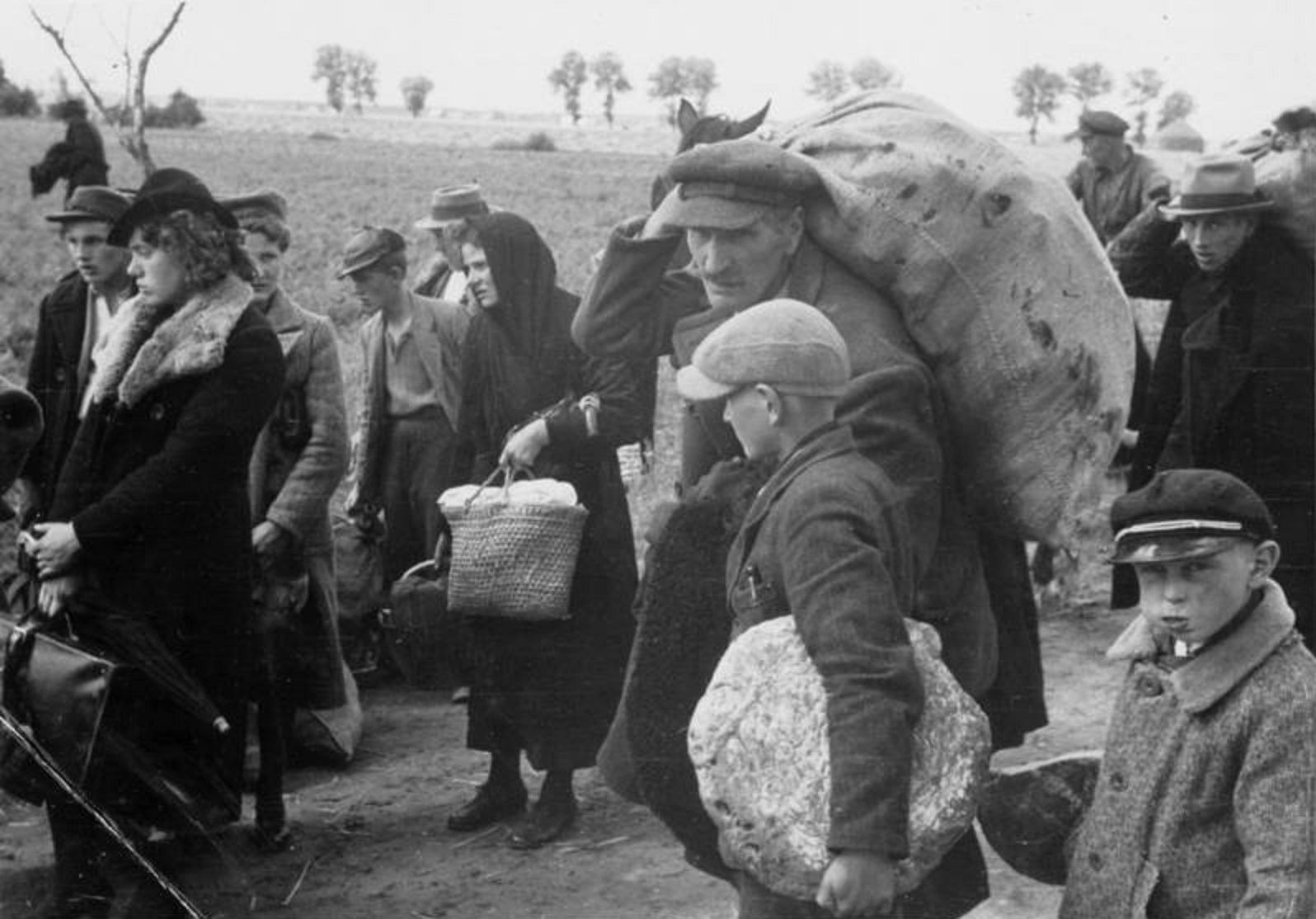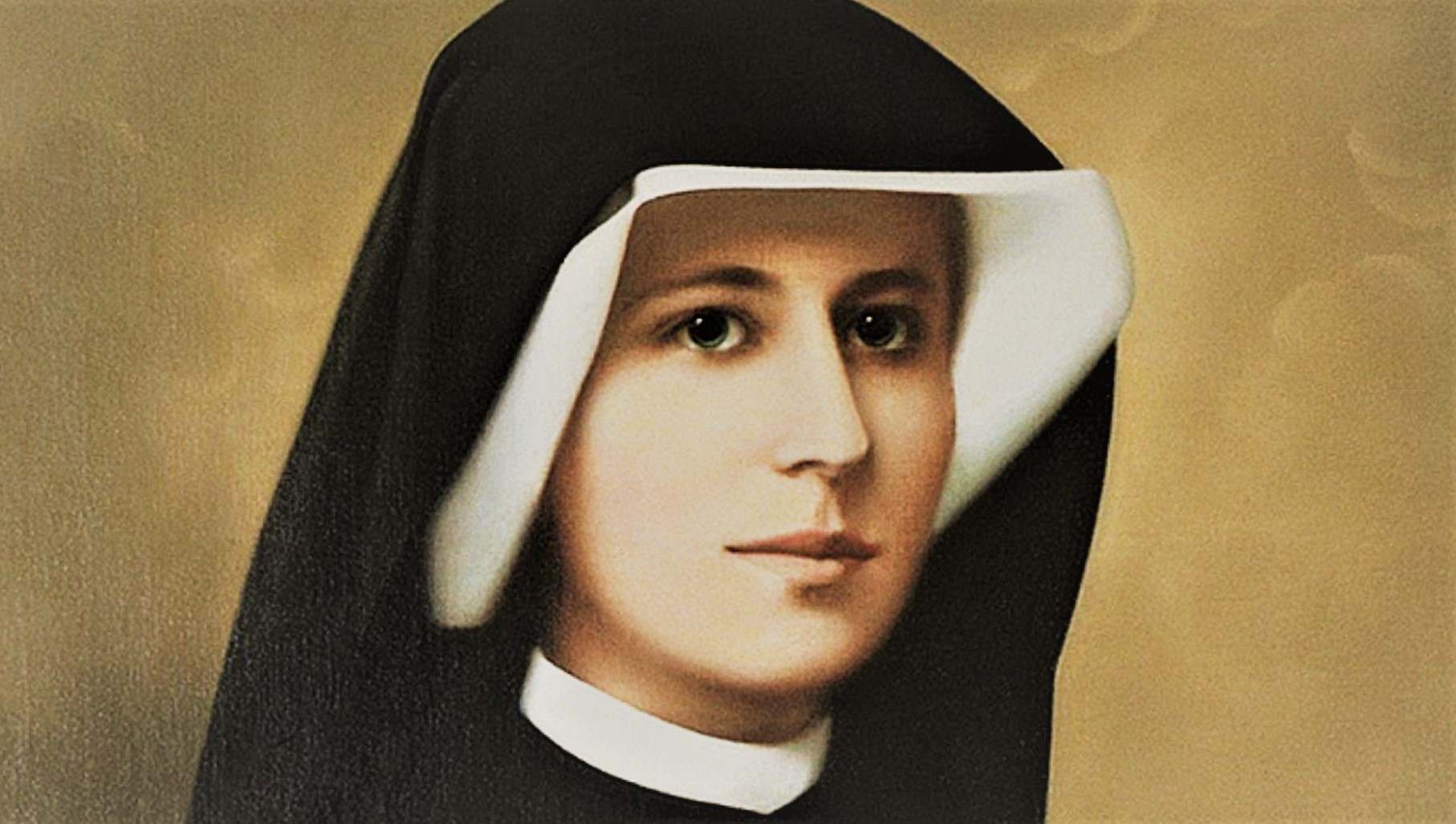At the end of the Second World War, the Polish community in Spain faced a major rescue project. After years of helping compatriots forging their way to freedom from German occupation through the French-Spanish border, it was time to help yet other Nazi victims – Polish unaccompanied children abandoned in Allied refugee camps.
by Dorota Choińska
Spain during the Second World War
Spain was not a belligerent side in the Second World War, but it was still affected by wartime turmoil. After the French capitulation in June 1940, Spain and Portugal, the last neutral countries of Western Europe, were not only seen as safe-havens free of Nazi domination, but also offered the last available overseas connections for civilians seeking to emigrate from the tormented continent and for soldiers attempting to join the British Army. Thousands of international refugees rushed from occupied France to the Iberian Peninsula, either hiring local guides to help them cross the Pyrenees or aided by various escape networks organized by the Allied intelligence services.
Spanish neutrality, however, was not all that obvious. The country’s dictator, Gen. Francisco Franco, was particularly endowed to the German leadership for their support of his military coup against the Spanish Republic in 1936. This is why the Francoist government succumbed to Nazi pressure to detain and intern all men of military age coming from belligerent countries, such as Poland. Economic reasons played an important part in the Spanish refugee policies as well, as the country was devastated by the Civil War and not ready to accommodate thousands of impoverished exiles. Individuals without the necessary documents and visas to swiftly continue their journey to further destinations and without the resources to sustain themselves during their stay in Spain were also detained and placed in prisons, forced residencies, and infamous internment camps. Such an attitude of the Spanish authorities caused the discontent of Great Britain and the United States. They considered the internment in Spain of thousands of potential recruits as not only a blow to Allied warfare, but also an infringement of the Spanish neutrality in favor of the Axis, and threatened Spain with economic repercussions and naval blockades.
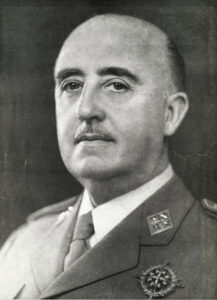
Among the incarcerated refugees, there were at least several thousand Polish citizens. The Polish consular representation in Spain and the Spanish delegation of the Polish Red Cross worked tirelessly throughout the war to have them released and to find safe houses for those who had managed to pass through the country unnoticed. The ultimate goal was to evacuate all Polish refugees to further destinations, such as Great Britain, the United States, or various South American and Caribbean countries. Despite the difficulties created by the Spanish government and the constant plotting of the Nazi officials, with the support of the Allies, the Polish representatives eventually managed to achieve it.
A new rescue project and initial obstacles
The Allied victory over Nazi Germany did not bring full respite from the aforementioned evacuation effort. Even though the war had ended, Polish citizens kept crossing the French-Spanish border, unwilling to return to new, communist-ruled Poland. Some of the wartime refugees who still had not managed to leave Spain also decided to remain there, thankful to the Spanish government for not handing them over to the Germans during the war years and encouraged by the Catholic devotion and fierce anti-communism of Franco’s regime. Spain, and particularly its capital, became one of the outposts of the Polish second Great Emigration, centered around the legate of the Polish government in exile, prince Józef Potocki. One of the main achievements of the Polish community was the creation of the first post-war radio station of the Polish emigration, “Radio Madryt”, in 1949. Its main publicist was a renowned Polish poet, Józef Łobodowski, who himself arrived in Spain as a refugee in the summer of 1941.
When the war was coming to a close, a new idea originated in the Polish circles in Madrid to bring to Spain around 40 Polish children from Allied refugee camps. They were to be located in a spacious villa located in Barcelona at Azucena street, which the Polish Red Cross had been renting since March 1944 to host Polish refugees. In June 1945, father Antoni Liedtke, the Delegate of the Polish Red Cross in Spain, presented this project to the Duke of Hernani, the Spanish Governor of the League of Red Cross Societies, and asked for his recommendation to the Spanish Ministry of Foreign Affairs. The Spanish authorities not only agreed just two weeks later to the arrival of 40 Polish children, but also, in November 1945, offered the British, American, and French governments to host, at the Spanish expense, around 50,000 children from the countries most affected by the war. Poland would be an obvious beneficiary of this program, but the Allies were far from enthusiastic, attributing this generous offer not to the Spanish humanitarian spirit, but the political goals of the regime of gen. Francisco Franco, ostracized by the victorious countries due to its controversial attitude during the war.

Finally, by the end of 1945, the British, American, and French authorities accepted the Spanish offer under the condition of presenting a detailed project of planned activities elaborated with the authorities of the involved countries or international organizations. This posed an enormous problem to the Polish community in Spain, representing the Polish Government in exile, which by that time was no longer officially supported by the Allied governments. Spain, on the other hand, did not recognize the new communist authorities from Warsaw (and wouldn’t do this until 1968) and thus was not willing to collaborate with them on the project. The UNRRA, which would be an obvious Allies’ choice as an intermediary humanitarian organization, was considered by the Polish Government in exile as too malleable to the pressure of the Polish communist government, which could put the entire endeavor in jeopardy. Moreover, Spain was not a member of UNRRA and thus would have to enter lengthy negotiations with this institution with the help of the Spanish and the International Red Cross.
The project takes off
The Spanish authorities decided to seek a partnership with the American Polish War Relief, an organization created in 1939 by the Polish American Council, the largest association of the American Polonia, coordinating humanitarian aid for the Polish war refugees. Its European representative, Florian Piskorski, based between 1941 and 1945 in Lisbon and recently moved to Geneva, immediately transferred the offer to his superiors in Chicago and received the headquarters’ approval to get involved in the project. At the beginning of 1946, Piskorski contacted the Polish Legation in Madrid, volunteering to organize a transfer of around 100 Polish orphans from a refugee camp in Salzburg, Austria, to Barcelona, under the auspices of the US Army. Prince Potocki confirmed the readiness of the Polish authorities and the Polish Red Cross to receive the children. The local authorities in Barcelona even offered additional accommodation for them, should villa Azucena prove too small.
The children were to arrive in Barcelona via the French-Spanish border crossing in Port-Bou. It had been frequently used by the refugees throughout the war – one of them was even the former Prime Minister Ignacy Jan Paderewski. Unfortunately, in the second half of February 1946, the relations between France and Spain deteriorated and the border between these two countries was unexpectedly closed, further complicating the realization of the project. The Polish legate, prince Potocki, then requested a permit from the Spanish authorities for the entry of the children by sea, which was soon granted.
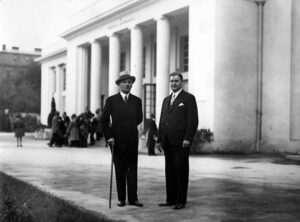
Polish children arrive in Barcelona
The first, long-awaited group of 35 children from Salzburg finally arrived at Barcelona’s port on board a Spanish ship “J.J. Sisters” on 24 April 1946. There were 12 girls and 23 boys, six to 16 years old, who before the war had lived mainly in the Silesia and Łódź regions. During the German occupation of Poland, they were sequestrated from their Polish parents, who were either killed or sent to work in the Reich, and adopted by German families, or otherwise Germanized as a part of the Nazi Lebensborn program. They were welcomed to Barcelona by the representative of the Polish Legation in Madrid, Józef Tyszka, the Delegate of the Polish Red Cross, Juliusz Babecki, and the Spanish authorities, and placed in a two-story villa at Angli Street, 46. Their arrival was a true sensation and was widely reported by the Spanish press.
Two more transports of Polish children from refugee camps in Austria and Italy followed on 19 June 1946 and 16 October 1946. In the meantime, 36 children had left Spain because their parents had been found or they were considered too old to remain at the Polish centre. Finally, in November 1946 there was a total of 101 Polish children in Barcelona, aged two to 18 years old: 34 girls, accommodated in the villa at Angli Street, and 67 boys, living in the newly adopted Vallcarca residence at Paseo de Nuestra Señora del Coll, offered by the Spanish authorities when the owner of Azucena building suddenly terminated its lease in July 1946.
Life at the Polish centre in Barcelona
The Spanish authorities offered to cover all the expenses concerning the maintenance and food for the children as well as for the Polish and Spanish personnel of the centre. The teachers working at the newly-organized Polish school were in charge of the education and upbringing of the children, while the administrative questions were managed by the so-called Technical Committee headed by Anna Klemensiewicz de Rodón, wife of the Polish Honorary Consul in Barcelona since 1931, Eduardo Rodón y Blasa. A special role of liaison between the centre and the Spanish authorities was given to Wanda Morbitzer Tozer. The two women had collaborated since 1932 when Wanda Tozer started working at the Polish Honorary Consulate in Barcelona, and they were both engaged in the rescue of Polish refugees during the war. Tozer’s activity drew the unwanted attention of the Spanish authorities, and in 1943, accused of espionage, she was forced to flee to Portugal. There, she worked for Florian Piskorski at the American Polish War Relief. She returned to Spain in 1946 and immediately got engaged in the creation of the centre for Polish children in Barcelona. She was actively involved in its functioning and daily activities, establishing relations with various Spanish institutions and enterprises which later supported the centre or offered professional opportunities to the older children. In November 1946, one common body, the Pedagogical Council, was established to take charge of all the decision-making related to the management of the centre, the children’s learning process, and their stay in Barcelona. Its leader was the principal of the Polish school, Stanisław Horoba, and it assembled all teachers and educators, including Wanda Tozer as a special liaison officer.
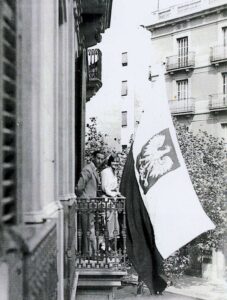
Immediately after arriving in Barcelona, the children were subjected to a daily routine: they woke up at 7:30 a.m. and got ready for breakfast and classes starting at 9 a.m. They were divided into school groups depending on their age and general knowledge. They attended reading and writing classes, arithmetic, and lectures about history, geography, and natural sciences. Three times a week they attended religious education. The school finished at 1 p.m. when dinner was served. In the afternoon, it was time for leisure: children played games, sports, and tended to their garden, but older children also attended additional courses in a Spanish vocational school. Three particularly talented children who spoke French were placed in a prestigious International College in Barcelona. The everyday routine was interrupted by holiday periods, such as Christmas, Easter, or Constitution Day, which were also treated as occasions to teach the children about Polish history and traditions. In the summer, the pupils, boys and girls separately, left Barcelona for several weeks to take some rest by the Mediterranean sea.
Despite this seemingly bucolic existence of the Polish colony in Barcelona, the functioning of the centre and the educational process were beset with difficulties. First of all, there were problems of a financial and organizational nature. Due to the lack of space, classes had to take place in the canteen, garage, and recreation rooms. There was no heating in the buildings and since children often lacked appropriate clothing, many of them got sick and could not attend school. The Spanish authorities often fell behind with the payments, resulting in high rotation of the personnel. Moreover, misunderstandings were common between the Polish and the Spanish employees, as a consequence of a language barrier and mutual ignorance of the cultures and mentality of the respective sides.
The wellbeing of the children also required constant and increased effort of the caretakers, particularly at the beginning of their stay in Barcelona. As a consequence of their dreadful wartime trajectories, they were almost completely eradicated from the Polish culture and many barely even spoke Polish. Many of them were severely traumatized and suffered due to years-long neglect. They had nightmares and, fearing hunger, kept on hiding food in their clothes and bed linen. They were depressed and scared, which sometimes manifested through egoistic or cruel behaviors towards others.
Departures, repatriations, and the end of the mission
Soon after the arrival of the children to Barcelona, news started to reach the administration of the Polish centre about the miraculously found families of certain children, inquiring about a prompt return of their offspring. Only three weeks after the first group of children disembarked on Spanish soil, three of them had already left to reunite with their relatives. In August 1950, only 52 (34 boys and 18 girls) out of the initial number of over 100 children, remained in Barcelona.
Other departures were quick to follow: to France, Germany, as well as repatriations to Poland. Since the Polish authorities in charge of the children in Spain represented the no-longer internationally recognized Polish Government in exile, and the children were to be handed over to the delegates of the Polish communist government not supported by the Spanish regime, the whole process had to be mediated once again by Florian Piskorski and the American Polish War Relief.
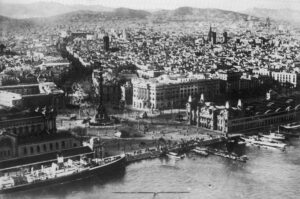
In addition to the departures significantly reducing the number of pupils attending Polish school, with the passage of years, the older children also gradually left it to go to Spanish vocational schools or to work. Only 14 youngest children attended the school at the Polish centre in October 1950. The institution slowly lost its “raison d’être”.
The first step for the ultimate end of the mission in Barcelona was taken in December 1951 when the first transport of 30 Polish children left to America, with the support of Florian Piskorski. There, thanks to the help of the Polish community in Buffalo, they were able to find accommodation and work. The decision was mainly due to the fact that Spain was still struggling with the gruesome effects of the bloody civil war well into the 1950s. The country was underdeveloped and extremely poor—rationing of basic foods, such as bread, sugar, and oil only ended in 1952—and thus did not offer the best perspective for young adults, who apart from the also impoverished Polish community, had no one to support them. The last 18 residents of the Polish centre boarded a plane from Lisbon to New York on 12 July 1956. They had been bid farewell by the Polish representatives in Barcelona and Madrid on their way to Portugal. This was the end of a 10-year mission for Polish children in Barcelona.
Preserved documents and memoirs of the Polish representatives suggest that the children were very glad to be starting a new chapter in the United States. However, the author of an article on the subject published in the Spanish press in 2008 claims that they had in fact felt uprooted from their new home in Barcelona; torn away from their friends and from the new Spanish environment and culture to which they had just started belonging. From the perspective of the Polish authorities, however, the project certainly came to a successful end. Thanks to the great commitment of the personnel involved, it was possible to overcome or at least mitigate major troubles haunting the children at the beginning of their stay. They became calmer, more sociable and self-reliant, enjoyed learning new things, and ultimately acquired skills that would prepare them for their adult lives. Just as importantly, they managed to restore their connection to their Polish homeland, its language, and its culture.
***
Article based mainly on the album Polonesos a Barcelona. Un munt d’històries: L’acolliment de la ciutat als nens robats pels nazis (1946-1956), Ajuntament de Barcelona i Consolat General de la República de Polònia a Barcelona, Barcelona 2009.
Author: Dorota Choińska
Translation: Alicja Rose & Jessica Sirotin

